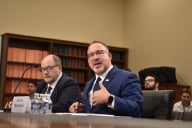You have /5 articles left.
Sign up for a free account or log in.
In 2010, advocates for students who don't identify as straight or conforming to one gender asked the Common Application to add optional questions on gender identity and sexual orientation. In 2011, the Common Application declined to do so. While some colleges in the intervening years started to ask such questions, they represent only a small minority of the institutions to which students apply.
This week, that's changing. Both the Common Application and the Universal College Application are changing their applications to make it easy for applicants who do not identify as either male or female to describe how they wish to be identified. While the applications are not at this time adding a question on sexual orientation, there are other places on the application where one could offer such information.
The Common Application, with more than 600 member colleges, is used by more than one million applicants, meaning that the new options on gender identity will be available to far more college applicants than ever before. The Universal College Application is smaller but has gained ground in recent years, in particular as more colleges have sought to avoid relying on one application. A representative of the Coalition for Access, Affordability and Success, a group of 93 leading colleges introducing an alternative application this summer, did not respond to questions on whether it too would have an option for transgender and gender-nonconforming applicants.
Both applications will continue to ask about gender in the traditional way, with officials of both applications saying that their member institutions want the close alignment with the way the federal government and other entities track data. But these questions will be rephrased in ways that acknowledge that this answer may not reflect students' identities. The Universal question will now be "legal sex." The Common App question will now be "sex assigned at birth."
The Common Application will then have a free response box for students to indicate additional information, such as transgender status. Universal will follow its legal question with an optional gender identity question where people will be given the choices of man, woman or self-identify (with a free response box for those who check it).
Both applications released statements from admissions leaders on why they viewed the change as significant.
Universal offered this statement from Jonathan Burdick, dean of college admission and vice provost for enrollment initiatives at the University of Rochester: “If I read the signs right on college campuses, our entire concept of gender might be at the start of a historic shift. I think we’re all going to have to take a step forward and stop assuming, to the extent that we do, that any specific person standing in front of us has an identity that we can discern at a glance. I think it might even eventually force us to adjust our pronouns and other language constructs. That’s kind of exciting, I think, to be living in a society on the cusp of a new, more sophisticated degree of understanding about what it means to be a human being.”
Common App offered this statement from Gil Villanueva, chair of its board and dean of admission at the University of Richmond: “The Common Application is not merely a collection of data points. It is, rather, a vehicle through which all students regardless of their background can express who they are. We want to make sure that all students have the ability to express themselves in the ways in which they feel most comfortable.”
A Long Campaign by Campus Pride
The group that first drew attention to the issue in 2010 and has been pushing ever since is Campus Pride. It coordinated a letter last year from 25 gay rights groups to Common Application asking it again to add the questions.
Shane Windmeyer, executive director of Campus Pride, said he would still like to see the applications add specific questions about sexual orientation, but that he was very pleased to see the additions now. He said that after last year's letter, Universal reached out and had a series of discussions about the issues with Campus Pride.
Windmeyer said that he thought the Obama administration's interpretation of Title IX of the Education Amendments of 1972 may have created more incentive for colleges to seek information about transgender applicants and students. The administration has said that Title IX, which bars sex discrimination at schools and colleges receiving federal funds, protects transgender students. Windmeyer said that colleges should know if transgender students are applying, enrolling and graduating -- and that data are needed to do so. He said that the same still applies to issues of sexual orientation.
"This information is vital," he said.
Windmeyer said he thinks today's generation of college applicants will view the new options for transgender applicants as something to be expected. "Young people today are far ahead of administrators when it comes to transgender issues," he said.








